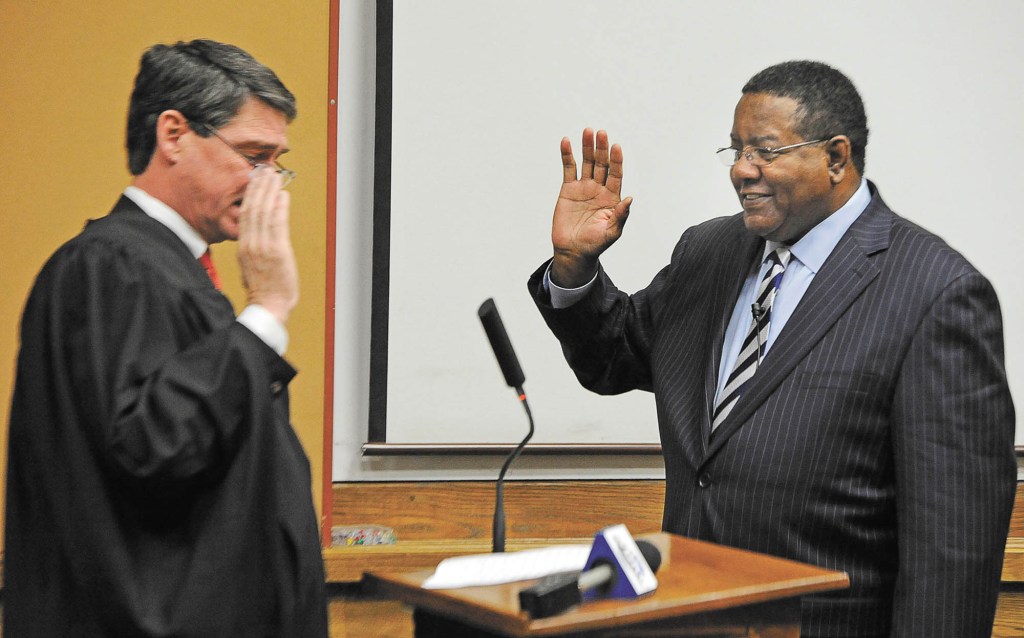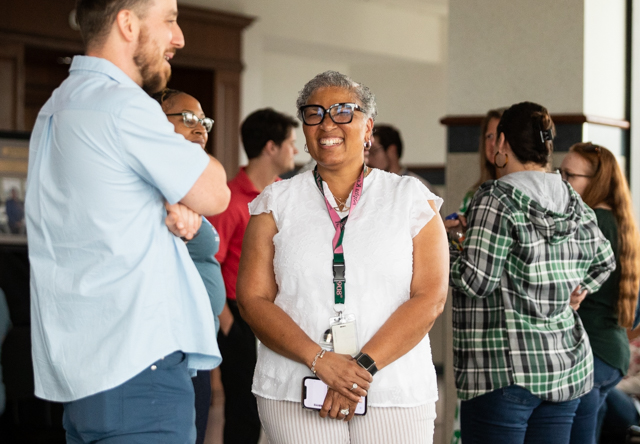Women, minorities make strides in politics
Published 4:07 pm Friday, September 14, 2012

- Mayor Joe Denning (right) is sworn in as mayor by Judge Sam Potter during a Board of Commissioners meeting at City Hall in 2011. (Daily News file)
Patsy Sloan remembers the long, tiresome days that came with the title of mayor.
As both the mayor of Bowling Green and a high school teacher, Sloan would often arrive at City Hall before school began and then go back to her government office after school hours. She dealt with a variety of needs and controversies – particularly squabbles concerning the hotel convention center, which went on to be successful and was named after Sloan.
Trending
But she never encountered problems surrounding her gender – Sloan was the first female mayor and city commissioner of Bowling Green. “I certainly didn’t run for office to be the first woman anything,” she said. “I just happened to be a woman who wanted to run for office.”
Over the past two centuries, women and minorities have made strides in Bowling Green politics. Barriers have been broken for women in leadership roles – since Sloan, other women have been elected mayor and local women have become judges, attorneys, commissioners, magistrates, police officers and other leaders – as well as minorities.
Joe Denning became the first black mayor of Bowling Green in 2011 when he was appointed to the position after former Mayor Elaine Walker left to become the Kentucky secretary of state. But it wasn’t the only first for Denning.
The Bowling Green native became the first black elected official in Bowling Green when he became a city school board member in the mid-1970s. He also was the first black police officer in Bowling Green and was the second black Kentucky State Police trooper, as well as the first black city commissioner, he said.
For Denning, who currently is a city commissioner, race has never been an issue during his time as an elected official, he said.
“I have never heard that in any of the elections,” he said.
Trending
As a young man, Denning never dreamed of becoming mayor. Even after he achieved his goal of becoming a police officer in 1968, politics were the last thing on his mind, he said.
“That probably was my last thought,” he said.
Born in Bowling Green in 1945, Denning was raised on Kentucky Street by his grandparents and aunt during a time of segregation. He vividly remembers the civil rights movement and recalls a time when he could not go to the same school, movie theater or restroom as white residents, and all city politicians were white men.
“There were not very many places that we as blacks could go in and eat, have recreational programs or anything,” he said. “We could go to two movie (theaters) … only two would accept blacks.” And Denning still was separated from white residents at those theaters – African-Americans were forced to sit in a different part of the theater.
Denning graduated from High Street High School, an all-black high school that Denning says did not have as many advanced programs or educational opportunities as other high schools. He remembers when the schools integrated, and black children began enrolling in Bowling Green High School. He also remembers all races sharing public restrooms for the first time, he said.
The civil rights movement in Bowling Green didn’t garner as much national attention as other Southern areas, “but that is not to say we didn’t have problems in Bowling Green,” he said. “But they were not at the height that Birmingham, Nashville and other places in the South had.”
After graduating, Denning worked at a few Bowling Green companies before joining the local police department and then the state police force.
“I’d always wanted to be in law enforcement,” he said, “and it was a good beginning for me. It started my adulthood.”
During those years, Denning became a spokesman for High Street High School, his alma mater. He made routine speeches to the school board when it was considering closing the school. The board was so impressed by Denning that when a board member resigned in the middle of the year, members asked Denning to take his place.
Denning’s first taste of politics came later that year, when he campaigned to keep his position as school board member. He served 18 years as a school board member and, after being elected city commissioner, was a commissioner for nearly 18 consecutive years before Walker left her position for Frankfort.
That’s when Denning, as mayor pro tem, was appointed mayor. He held that position for less than a year until he lost the election in November to current Mayor Bruce Wilkerson. Now, Denning has returned to local government as city commissioner, and he has no immediate plans to leave, he said.
“I firmly believe … if you’re going to live in this community, you need to be a participant in this community,” he said. “I hope that is one of the things that can be said about me, that I represented my community to the best of my ability.”
Similarly, Sloan said the best part of government service for her was the ability to help community members. Her best work wasn’t necessarily broadcast at meetings or in the news, but was rather behind the scenes, she said.
Sloan, a Texas native, became interested in politics at a young age when she majored in government at the University of Texas and went on to get her master’s degree in political science.
“But it didn’t click with me until some years later that I would be part of the process,” she said.
Her husband’s job brought Sloan to Bowling Green in 1969, and her first real-world taste of politics came in 1971 when she volunteered for a state legislator’s campaign. She later became active in President Jimmy Carter’s campaign, but her main job was as a high school teacher.
In fact, it was her students who convinced Sloan to run for office herself. So, she ran for city commissioner in 1977.
“It was a little intimidating – 12 men (on the ballot) and me,” she said. “I was never treated badly. Nobody ever made me feel out of place, but some did treat me like a little puppy they were petting on the head.”
She served five terms as city commissioner before deciding that it was time to take the next step and run for mayor.
“I would rather give it a try instead of sitting in my rocking chair thinking, ‘I wish I’d given that a shot,’ ” she said.
She ran for office in 1987 and won – it was her sixth consecutive election that ended in victory. While it was enjoyable, the position was anything but easy. Sloan found herself working long hours – she kept her full-time position as a teacher – and constantly under the spotlight. She also dealt with controversy, particularly construction of the current Sloan Convention Center. At the time, many thought the project was not feasible, she said.
“It was difficult. I discovered I had a really thick skin,” she said.
While she didn’t intend to be the first female mayor, the fact that she was resulted in a lot of self-imposed pressure, she said. “It was of great concern to me to not screw it up,” she said, “and make it more difficult for other women.”
After a combined 14 years in city government, Sloan decided not to run for re-election after her first term as mayor. But that didn’t mean she dropped out of politics. She continued to help others on campaigns and became a member of the Warren County Downtown Economic Development Authority and the Bowling Green-Warren County Airport Board.
But she will always remember her time in city government, she said. “City government touches people where they live their lives,” she said.







